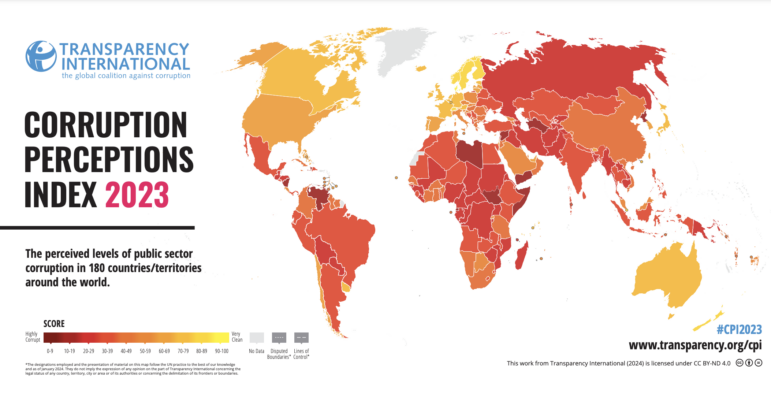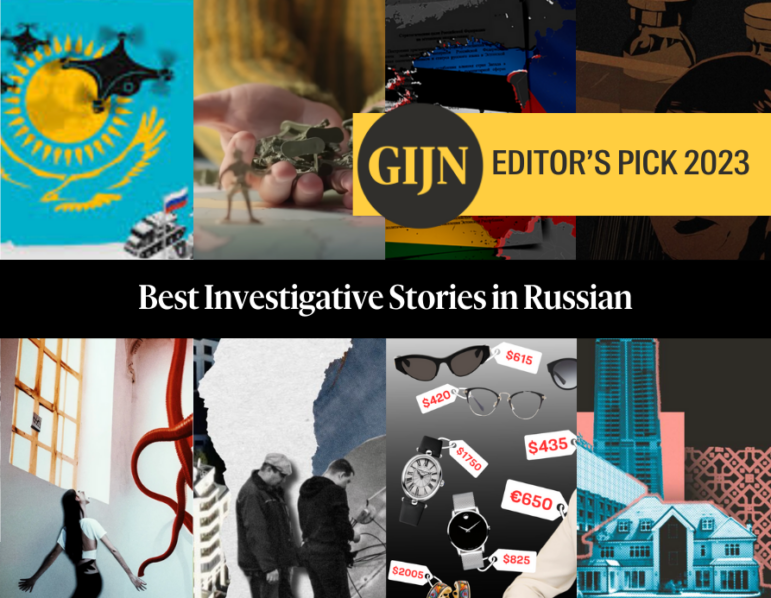

Editor’s Pick: 2019’s Best Investigative Stories in Russian and Ukrainian
It is no easy task picking just a few of the top investigations coming out of Eastern Europe, Central Asia, and the Caucasus — the territory which extends between the Black and Caspian Seas. To hone down her choices for this year’s Editor’s Pick in the region, GIJN in Russian Editor Olga Simanovych focused her selection on stories that used innovative approaches or new tools, or shed light on topics not usually covered.
The investigations below impressed with the variety of methods and new approaches, including cross-border cooperation; journalistic solidarity; work with open data, registries, and public information; use of whistleblowers and leaks; mastery of planespotting tools; undercover work; and a regional perspective on global gender and environmental issues.
Another criteria for selection was bilingual access to stories. The stories included, therefore, are available in Russian or Ukrainian as well as in English, and many include text as well as video versions.
What the Kremlin Chef Cooks in Zones of Armed Conflict — Novaya Gazeta (Russia) and OCCRP
Journalists tracked the plane of a businessman associated with private Russian military units acting in eastern Ukraine, Syria, and Africa, who is often called “Putin’s chef” because his businesses cater Kremlin dinners with foreign guests.
Reporters Irina Dolinina and Alesya Marokhovskaya, along with Novaya Gazeta’s data team, followed the movements of Yevgeny Prigozhin’s plane for 26 months and documented many trips to Syria, the Middle East, and frequent hops to Africa. These flight routes led the journalists to dig in deeper into the reasons for these trips.
For example, his trips to the Central African Republic could be associated with companies connected to Prigozhin that have invested in the development of gold and diamond mines. The journalists managed to track down a contract granting the Russians the right to make cash payments to government officials, which noted that the delivery of cash “is only possible on a private jet.” Meanwhile, companies associated with Prigozhin received permission to mine for gold, diamonds, and other minerals in the Central African Republic, as well as in Sudan and Libya, under the auspices of the Ministry of Energy of Russia.
Army! Friends! Dough! — Bihus.Info (Ukraine)
Scrupulously comparing data from official documents and international databases with messages from leaked correspondence, Lesya Ivanova revealed a corruption scheme that siphoned about $10 million from Ukraine’s state defense industry. It was a painful expose in a country where retirees and students donate money to help the army defend eastern Ukraine from Russia. The piece explained how three young men, through a series of bribes and kickbacks, sold to the state-owned military factories spare parts that were smuggled from Russia or even stolen from the Ukrainian army — with a profit at double or even quadruple the market price.
One of the men involved in the scheme was the eldest son of the first deputy secretary of the National Security and Defense Council of Ukraine, a personal friend and business partner of former Ukrainian President Petro Poroshenko. Journalists also found evidence of the possible involvement of the father in his son’s scheme, as well as evidence that law enforcement agencies, including the General Prosecutor’s Office, the Security Service, and the National Anti-Corruption Bureau, knew about the fraud scheme but turned a blind eye.
The Troika Laundromat — OCCRP, 15min.It, and an international team
A new international money-laundering scheme was revealed by OCCRP and its partners, thanks to one of the largest banking information leaks in history, containing data on 1.3 million transactions totaling $470 billion. The scheme got its name “Laundromat Troika” in honor of its organizer, which was “Troika Dialog,” a Russian private investment bank. Using this offshore scheme, oligarchs and politicians drove billions from Russia and anonymously bought up shares in state-owned companies, bought real estate in Russia and abroad, purchased luxury yachts, and paid superstars for concerts at private parties.
The journalists found at least 75 offshore structures associated with Vladimir Putin’s old friend, cellist Sergei Roldugin. One of the darker stories of this investigation is around lawyer Erich Rebasso, who admitted to the Austrian authorities that he helped to launder millions of dollars, and later died under mysterious circumstances.
Russian Data Theft: Shady World Where All is for Sale — BBC (Russia)
Reporter Andrey Zakharov studied the black market for selling personal data in Russia and found out that for a little cash, you can buy passport data, detailed information about the telephone calls and routes of a mobile subscriber, or even the balance on a bank account or a code for a credit card. Zakharov was able to buy information about the owners of two mobile numbers with detailed locations of their phones in just a few hours for 10,000 rubles (about $150) as well as Russian passports, including photos and application forms, for less than 2,000 rubles, or about $35.
Court decisions analyzed by Zakharov showed the scale of the problem: ordinary employees of government agencies, mobile operators, and bank staff carry out the orders of intermediaries from illegal forums. Living throughout Russian provinces, they sell information about citizens from all over the country.
Scrap Metal for Transnistria — RISE Moldova (Moldova) and Schemes (Ukraine)

Former Prime Minister of Moldova Pavel Filip and former President of Ukraine Petro Poroshenko. Screenshot: Rise Moldova
Investigating the illegal export of metal from Ukraine to the internationally unrecognized republic of Transnistria — formerly part of Moldova — Ukrainian journalist Valeria Yegoshina and Moldovan journalist Vladimir Thorik revealed secret agreements at the highest level.
They found documents confirming that then-President of Ukraine Poroshenko secretly lifted Ukrainian sanctions from the Moldavian Metallurgical Plant (MMP) in Transnistria following the request of Moldovan Prime Minister Pavel Filip. MMP had been under Moldovan jurisdiction, but is now under the control of the government of the unrecognized Transnistrian republic. Like many local companies in Transnistria, it does not pay any taxes or customs duties to Moldova. The cancellation of trade restrictions contradicted the state interests of both Moldova and Ukraine.
Destinies Blackened in Wedding Dresses — Open Caucasus Media
Azerbaijani journalist Gulnur Kazimova raised the painful and still-taboo topic in Caucasus countries of early marriages and domestic violence. The journalist told tragic stories of girls from Azerbaijani communities of Georgia. The 13- to 16-year-old girls were forced to drop out of school and marry men they didn’t love. Some were beaten and forced to have sex or do domestic work. Even when the young women took the risk of contacting the police, investigators wouldn’t initiate a criminal case as they consider violence and early marriage to be family affairs.
Despite tightening Georgian laws against early marriage, almost a third of married ethnic minority women had wedded before turning 18.
Mining Caucasian Gold: Corporate Profits Come at a High Price — Hetq (Armenia)
Journalist Kristine Aghalaryan found out that gold from the most profitable deposits of Georgia and Armenia are extracted by foreigners through companies registered offshore, and associated with various government entities of the Russian Federation and China. According to Hetq journalists’ data, this mining amounts to millions of dollars. For example, GeoProMining Gold LLC, whose ultimate beneficiaries are located in Russia, made $78.2 million in a year from Armenia’s Sotk mine. That’s 10 times higher than the entire budget of Armenia’s second largest city, Gyumri.
The journalists also found out that there are constant safety violations, that workers are denied the right to paid sick leave and other types of social protections, and that the local communities near both Sotk and other mines have polluted air and water as well as abandoned dumps of toxic waste and other environmental issues.
Who Owns Moscow’s Cemeteries — Meduza and a team of nine other media houses (Russia)
This investigation describes the struggle for control over Moscow cemeteries, which began with a mass brawl and shootout, and ended with the emergence of new beneficiaries — businessmen associated with the capital’s department of the Federal Security Service of Russia.
The investigation was a show of unprecedented solidarity among Russian journalists. In the course of working on the story, its author, Ivan Golunov, was detained on false charges of attempting to sell drugs. After Golunov’s arrest, journalists from leading outlets in Russia — Forbes, The Bell, Vedomosti, Novaya Gazeta, RBC, BBC Russian, Fontanka, as well as OCCRP and Lorem Ipsum — joined in on his investigation. At the same time, protests were held throughout Russia demanding that the charges against the journalist be stopped. Five days later, the Ministry of Internal Affairs, due to lack of evidence, dropped all charges. However, the joint team of journalists continued to work on the story, with at least 30 Russian media publishing their own versions.
Inside a Ukrainian Troll Farm — Slidstvo.Info and hromadske.ua (Ukraine)
Working on this investigative documentary, Slidstvo.Info journalist Vasyl Bidun got a job in the office of a Kiyv bot farm — an “agency” that writes laudatory or angry paid comments on social media per customers’ orders. Vasyl’s duties included writing 200-300 comments per day via several fake Facebook profiles, either supporting or abusing the Ukrainian politicians who took part in the parliamentary elections. In two weeks, the bot team left 24,000 posts in support of Anatoly Gritsenko, and the next week wrote 6,000 posts in favor of Svyatoslav Vakarchuk after receiving an order to support him and his political party “The Voice.”
Thanks to this undercover work, the journalists of Slidstvo.Info found out that the annual budget of the bot market could be estimated at millions of dollars per year, while their employees are working under the table and paid in cash. The 9,000 hryvnas (about $380) that Vasyl earned doing this work was given to charity. The bot farm was exposed and blocked by Facebook two days before the documentary was aired. (The documentary also is available in English).
Public Land, Private Hands (The Park that Was Lost) — Kloop (Kyrgyzstan) and OCCRP
Journalists uncovered that between 2000 and 2008, local authorities handed over a major part of Ataturk Park, a legally protected area and one of the favorite parks of the residents of the capital of Kyrgyzstan, Bishkek. The land was secretly given to wealthy and well-connected people, including officials, businessmen, politicians, intellectuals, and their relatives. Bishkek residents only learned about land squandering when private construction began in the park.
Journalists from Kloop and OCCRP analyzed hundreds of cadastral statements, local government decisions, court decisions, and other documents; sent more than 60 FOIA requests; talked with dozens of people; and even visited the just-built mansions as buyers to collect data, in order to put stories about each of the 181 land sites on an interactive map.
 Olga Simanovych is GIJN’s Russian-language editor. She has worked as a screenwriter, media trainer, managing editor, TV news reporter for Vikna-Novyny on STB and has participated in SCOOP‘s international investigations. She is fluent in Ukrainian, Russian, English and Greek.
Olga Simanovych is GIJN’s Russian-language editor. She has worked as a screenwriter, media trainer, managing editor, TV news reporter for Vikna-Novyny on STB and has participated in SCOOP‘s international investigations. She is fluent in Ukrainian, Russian, English and Greek.



















